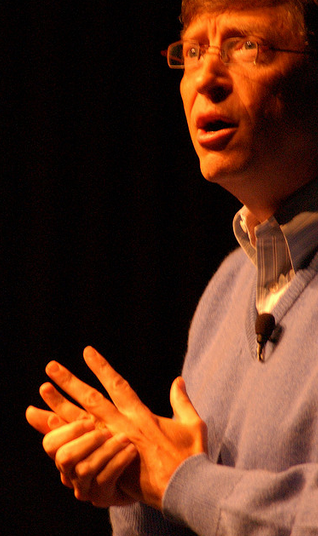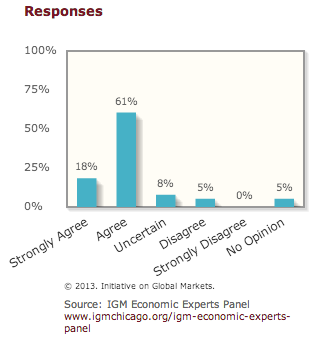
What do influential people think about bitcoin?
Just like any other movement, bitcoin needs people who can be symbolic leaders. Specific examples are people like Gavin Andresen, bitcoin’s chief scientist, who works as the lead developer on the Bitcoin protocol. Another one is Patrick Murck, the Bitcoin Foundation’s general counsel, who has been busy helping to forge a path forward for regulatory compliance.
These are people that are well qualified for their specific duties. Yet bitcoin needs influencers beyond that. It needs global leaders outside of cryptocurrency circles and people of some renown to speak out about it. So who has done this? Let’s take a look.
Bill Gates
When it comes to the business side of technology, Bill Gates has made himself a very wealthy individual. Often described as irascible during his time as Microsoft’s CEO, he has since mellowed now that he’s outside of the private sector.
As the chairman of his own foundation, which he runs with his wife, Gates looks to tackle difficult problems that perhaps capitalism can’t solve. One of his focal points has been in Africa, a continent where people are grossly under banked, which makes it fit for digital currencies like bitcoin.
In terms of finding problems for smart people to solve, digital currencies are one area that Gates believes has promise in terms of development.

That’s not exactly an endorsement of bitcoin, but that may be because Gates isn’t concerned about which digital currency thrives. It’s the concept that he believes in because transaction fees ultimately affect those with less financial means more than others.
It’s no wonder, then, that Kenya’s M-PESA on mobile phones has become so popular. Gates has probably seen its beneficial effects first hand while spending time in Africa.
Jim Cramer
Cramer is the host of CNBC’s nightly investing show Mad Money. He’s also a former hedge fund manager. He has a quirky, high-energy personality that works well on television, making investing fun.
Although he’s mostly a stock market investor, he is seen by many as an economic expert as well. During the 2008 financial crisis, he was featured as a commentator on the news regarding the banking collapse.

Cramer was featured on an episode of the Good Wife called “Bitcoin for Dummies” that revolved around an illegal currency. In it, he plays himself and opines that “There’s no central bank to regulate it; it’s digital and functions completely peer to peer.”
To say that he “endorsed” bitcoin in the show is a little off, but he does have knowledge of it. Cramer’s audience is comprised mostly of viewers looking to invest for retirement. Because of this, he’s not going to give an overly glowing opinion that makes people go out and buy bitcoins. It’s a store of value, for sure, but because of its relative youth compared with other financial instruments, it would be hard to recommend as a watertight strategy for retirement at its current stage.
Ashton Kutcher
As well as being successful in the movie business, Kutcher has been successful in the technology space. Airbnb, Uber and Foursquare are among the better-known companies he’s invested in. With his firm A-Grade Investments, he’s surrounded himself with smart people that give him good perspective on the future. Bitcoin, for Kutcher, has been no exception to this when he said at TechCrunch Disrupt “the bitcoin revolution is taking place.”
In terms of digital currency-based ventures, Kutcher has investments in BitPay and Dwolla.
Al Gore
Al Gore has long been known as an expert on technology policy. As former Vice President and board member of Google, he is uniquely in touch with digital concepts. This gives him some understanding of new paradigms like bitcoin. And he has a favorable position; something he talked about during the The Innovation Project 2013.

So Gore’s position is that because bitcoin is exchanged for fiat currency, it needs to be properly regulated. But he likes the more freewheeling aspects of it; an interesting take for a former politician.
A university study
The University of Chicago’s Booth School of Business, known for economic acuity, released a somewhat unfavorable survey about what economists think about bitcoin.
When posed this statement, 61% of economists agreed that “A bitcoin's value derives solely from the belief that others will want to use it for trade, which implies that its purchasing power is likely to fluctuate over time to a degree that will limit its usefulness.”

Although there have been influential people that have expounded on the positive aspects of bitcoin, it is perhaps the experts in financial policies that lead the way. Surveys like this from Chicago Booth have some merit. Yet in order for bitcoin to thrive it will likely require positive opinions from popular people who the mainstream public listens to.
So let’s assume that it is true that bitcoin’s value comes from the belief that others will want to use it, like the survey suggests. If so, the more influential people who talk about it, positive or negative, the better off it will probably be.
Who do you think would be an ideal person to offer a confident opinion about bitcoin? Do you think that there is an individual that could help to increase the level of bitcoin adoption?
DISCLOSURE
The leader in news and information on cryptocurrency, digital assets and the future of money, CoinDesk is a media outlet that strives for the highest journalistic standards and abides by a strict set of editorial policies. CoinDesk is an independent operating subsidiary of Digital Currency Group, which invests in cryptocurrencies and blockchain startups. As part of their compensation, certain CoinDesk employees, including editorial employees, may receive exposure to DCG equity in the form of stock appreciation rights, which vest over a multi-year period. CoinDesk journalists are not allowed to purchase stock outright in DCG.

